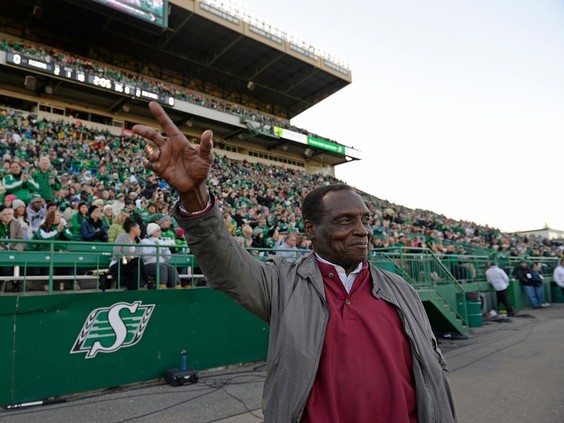
Prince Albert Minor Football president Taras Kachkowski was a rookie head coach when he met George Reed for the first time.
Kachkowski was in Saskatoon for a football coaching clinic and Reed was the guest of honor. At the time, Kachkowski was a little unsure of himself, so he decided to ask the legendary Saskatchewan Roughrider RB for advice.
“I took the opportunity and admitted that I was probably one of the least experienced coaches in the room because it was right after our pee wee program started,” Kachkowski said with a chuckle. “I said, ‘what kind of advice do you have for a rookie coach working with pee wee players? What piece of advice would you have?
“He took a moment and thought for a second and he said, ‘just keep it fun so the players enjoy the game, so they keep coming back and wanting to play it more.’ Going on 15 years later, those words are what I continue to strive to do when I’m coaching our pee wee players for sure.”
That brief interaction was the only time Kachkowski ever met George Reed. It was the first thing he thought of when he heard about Reed’s passing on Sunday, one day before his 84th birthday.
“It’s definitely a treasured memory for sure,” Kachkowski said of the meeting.
“He definitely has that legendary status, not just in our province as well as the Riders, but any CFL fan everywhere knows who he was. He was always well-respected for his accomplishments in the game and then of course in the community after his retirement.”
Reed joined the Saskatchewan Roughriders in 1963 and wasted little becoming the most dominant RB in the CFL. In 1965 he became the first Rider to win the CFL’s Most Outstanding Player Award, and led the Riders to a Grey Cup championship one year later.
Saskatchewan defeated the Ottawa Rough Riders 29-14 for the franchise’s first title. Reed was named Grey Cup MVP after rushing for 133 yards and one touchdown.
The Riders returned to the Grey Cup in 1967, 1969, and 1972. They never won another championship during Reed’s playing days, but he did everything he could to help the club stay competitive. Reed was named a CFL all-star from 1965-69, and from 1971-74, and when he retired just before training camp in 1976 he was the CFL record holder for most rushing yards, rushing touchdowns, and 1,000-plus yard seasons.
St. Mary High School football coach Curt Hundeby never had a chance to watch Reed play live, but enjoyed watching the Roughrider RB’s highlights.
“He was a total running back,” Hundeby said. “When he played I know there was more money to come up to the CFL than to play in the NFL, as weird as that is to say now, so he had opportunities to play down south and to become a great NFL running back, but he chose the money to come up here.
“He was strong, he was fast. I mean, he was tough. He’s everything that you’d want a running back.”
Hundeby had a chance to meet Reed briefly at a University of Saskatchewan Huskies dinner. He credited the Riders star for not only leaving a legacy of high quality play, but also being among a group of players who made it popular to settle in Saskatchewan after retiring.
“(They) set that tone and stuck around in Regina, made it home (and) had families,” Hundeby said. “I think it’s actually one of the reasons why Regina football is so strong. The Rider influence has been huge over the over the years and over the decades.”
Reed wasn’t just known for his on-field accomplishments. He helped establish the CLF Players’ Association, serving as president for more than a decade, and began the George Reed Foundation, which supports youth living with physical and intellectual disabilities.
Reed was a strong supporter of the Saskatchewan Special Olympics, and in 1975 he received the CLFPA’s Tom Pate Award for his significant contributions to his team, his community, and the Association.
Carlton Comprehensive High School football coach Lindsay Strachan said Reed’s style of play on the field, combined with his love for the local community, helped cement his status as a fan-favourite long after his playing days ended.
“(Reed) was a phenomenal player, and just seemed like a phenomenal person as well,” Strachan said.
“Saskatchewan football is known nationwide as tough, hard-nosed, disciplined football, and I think … those attributes, (being a) tough runner, (and) that blue collar work ethic speaks to this province and the things that we value in our athletes and our football team.”
In a statement released on Sunday, Saskatchewan Roughriders president and CEO Craig Reynolds credited Reed for making Saskatchewan and the CFL a better place during his life.
The Riders will announce plans to honour Reed’s legacy in the coming days.

